This first ever literary festival in the scenic hill station of Kasauli was staged in October to acknowledge the life and literary work of celebrated editor, novelist, columnist and bon viveur Khushwant Singh
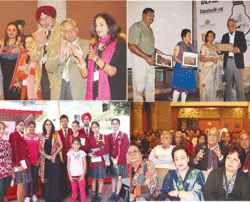 It’s been raining literary festivals in India. The now hugely popular and successful Jaipur Literary Festival (JLF), which was first held in 2006, became a trend-setter and started the downpour. It now attracts thousands of aficionados from India and abroad, all of whom are keen on mingling with literary celebrities. Every year since then, JLF has managed to attract Nobel laureates and Booker prize winners including V.S. Naipaul, Orhan Pamuk and J.M. Coetzee.
It’s been raining literary festivals in India. The now hugely popular and successful Jaipur Literary Festival (JLF), which was first held in 2006, became a trend-setter and started the downpour. It now attracts thousands of aficionados from India and abroad, all of whom are keen on mingling with literary celebrities. Every year since then, JLF has managed to attract Nobel laureates and Booker prize winners including V.S. Naipaul, Orhan Pamuk and J.M. Coetzee.
This year the invitation to Salman Rushdie, author of The Satanic Verses (1988), and its sudden withdrawal, for fear of agitations and unmanageable protests, provoked an international uproar, but it put Jaipur on the literary world map. The success of JLF, both financially and publicity-wise, prompted several imitators: literary fests have now become routine annual events in Bangalore, Kochi, and even Goa.
Last June, some of us were holidaying in Kasauli, a scenic army cantonment, 6,000 ft above sea level in the foothills of the Himalayas. We were attending the Kasauli Week celebrations, an annual event organised by the military-run Kasauli Club (estb. 1880).
Before I proceed further, a few words about Kasauli. Like most ‘hill stations’, it was established during the British Raj in the early 19th century, soon after they defeated the Gurkhas who had till then ruled over the region (a ruined Gurkha fort still stands near Kasauli). The last major impediment to British suzerainty over the Indian sub-continent was the Sikh kingdom of Punjab. Hence, a number of military garrisons, or canton-ments, were set up around Punjab. Kasauli was one of them, together with nearby Dagshai and Sabathu. Later, Kasauli and Shimla, some 60 km deeper into the Himalayas, became the region’s most popular hill stations. A British-style club, with a ballroom, bar, tennis and squash courts came up in 1880, with the brigadier posted there invited to head the club, a tradition which still endures.
After India wrested independence from British rule in 1947, almost all Britishers, military and civilians, who owned bungalows in Kasauli, sold them to wealthy Indians keen on having a summer home in the salubrious hills. That is how my maternal grandfather, Sir Teja Singh Malik, a successful civil engineer, bought a house there and named it Raj Villa, after his wife. Raj Villa is also where my father, Khushwant Singh, now 98 years old, did most of his writing.
While on a vacation there this summer, my long-time companion, Niloufer Bilimoria, mooted a suggestion to stage a Khushwant Singh literary festival in Kasauli. I dismissed the idea out of hand, but when we discussed it with Brigadier Anantha Narayan and his wife Aparna, much to my surprise they were most enthusiastic.
Their warm endorsement of the proposal proved decisive. The brigadier in Kasauli is all-powerful. He is not only in charge of the Kasauli Club, but has great influence in the entire region. Apart from providing us complimentary rooms at the club, he persuaded some hotels and resorts in and around Kasauli to do the same. Thus, accommodation for speakers and invitees was secured, a major financial worry. The club’s large ballroom and open-air verandah (with a magnificent view of Kalka and Chandigarh below), which together could accommodate 500 people, was the venue of the litfest.
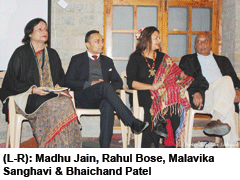 We were on our way and proceeded to assemble a team: Ashok Chopra, head of Hay House publishing; international banker Anand Sethi and his wife Deepa; Kishie Singh, a former vice principal of Delhi Public School, who lives in neighbouring Dagshai; and Chandan Bhullar, motoring expert and events management wizard who has a home in Kasauli. They were all excited and gave their valuable time, gratis. Now, the tricky part: financing. Bharat Doshi, an old friend and financial head of the Mahindra & Mahindra group — we are on a committee of the K.C. Mahindra Trust which awards scholarships for higher study — got the ball rolling with a generous donation of Rs.3 lakh.
We were on our way and proceeded to assemble a team: Ashok Chopra, head of Hay House publishing; international banker Anand Sethi and his wife Deepa; Kishie Singh, a former vice principal of Delhi Public School, who lives in neighbouring Dagshai; and Chandan Bhullar, motoring expert and events management wizard who has a home in Kasauli. They were all excited and gave their valuable time, gratis. Now, the tricky part: financing. Bharat Doshi, an old friend and financial head of the Mahindra & Mahindra group — we are on a committee of the K.C. Mahindra Trust which awards scholarships for higher study — got the ball rolling with a generous donation of Rs.3 lakh.
Close friends of my father, Nanak Kohli, Trilochan Sahney, 'Bubbles’ Charanjit Singh (owner of Delhi’s Meridien Hotel), Sir Ghulam Noon, the fast food king of Britain, Dr. Yusuf Hamied, head of Cipla Pharma, Kim Lalli, a London-based lawyer, Hiru Bijlani, management consultant, all pitched in with EducationWorld sponsoring cash prizes for students who took part in an essay competition on Kasauli’s ecology. We managed to collect around Rs.10 lakh for the event, but felt another Rs.5 lakh would be more comfortable. I found a letter from the well-known architect, Mohit Gujral, announcing that DLF, of which he is the vice chairman, was developing properties near Kasauli. An appeal for sponsorship to him got an immediate response and a donation of Rs.5 lakh.
We were home, and dry financially. A budget of Rs.15 lakh may sound meagre for a fest, but our aim was not to make it into a statement piece, or to match the JLF. Our aspirations were more modest, focusing on Khushwant Singh and his passions, and of course, on Kasauli. Since Kasauli is a cantonment, the festival was dedicated to the young Indian soldier. And as Kasauli, like most hill stations, is an ecologically fragile region, suffering massive deforestation, unregulated construction and a severe water shortage, environment conser-vation became a parallel theme of the festival.
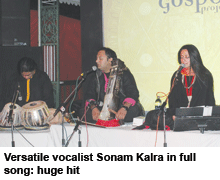 We decided to invite speakers to talk on some of these subjects. Advocating closer ties with Pakistan has been among the many causes my father has relentlessly pursued. So, we had to try and get a well-known Pakistani to the litfest. Salima Hashmi, the professor-daughter of the famed poet, Faiz Ahmed Faiz, braved a ten-hour drive from Lahore to Kasauli, across the Wagah border to be with us. She was one of the major draws of the festival. We needed a star attraction on the first evening to launch the fest. Sonam Kalra, one of India’s most versatile vocalists whose range spans everything from classical, to sufi and rock, squeezed us into her busy schedule, with her musicians. She was a huge hit.
We decided to invite speakers to talk on some of these subjects. Advocating closer ties with Pakistan has been among the many causes my father has relentlessly pursued. So, we had to try and get a well-known Pakistani to the litfest. Salima Hashmi, the professor-daughter of the famed poet, Faiz Ahmed Faiz, braved a ten-hour drive from Lahore to Kasauli, across the Wagah border to be with us. She was one of the major draws of the festival. We needed a star attraction on the first evening to launch the fest. Sonam Kalra, one of India’s most versatile vocalists whose range spans everything from classical, to sufi and rock, squeezed us into her busy schedule, with her musicians. She was a huge hit.
A few more celebrities added sizzle to the occasion. Actor Rahul Bose has a home in Kasauli (what many don’t know is that he is the grandson of Gen. Thorat, one of our most distinguished generals and a contemporary of Field Marshal Cariappa and Gen. Thimayya) and cheerfully lent his presence. Deepti Naval, the accomplished actress also a fine writer and artist, was an agreeable invitee as was writer-columnist Shobhaa De, whose most recent book, Sethji, has just been released.
Juggi Bhasin, whose first novel, The Terrorist, has already become a bestseller, with Bollywood showing interest in filming it, discussed security issues with noted expert Gen. Kamal Davar, another Kasauli resident. Art historian and curator Yashodhara Dalmia provided insights into India’s first modern artist, Amrita Shergill, who spent her early years in the region and on whom she has written an acclaimed biography. Pradip Krishen, whose book on Delhi’s trees has become a classic, had the audience riveted with his talk on how he has helped revive the original flora around the Jodhpur fort.
|
EW ecology essay contest
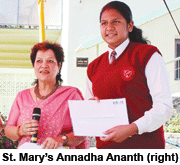
Among the events staged was an essay competition for local schools sponsored by EducationWorld. Forty students submitted essays on the subject, ‘What I can do to preserve and enhance the environment of Kasauli’, with Tarun Nair of Pinegrove School winning the top cash prize of Rs.5,000. Runners-up Priyanka Rinihan of the Saraswati Niketan School and Sonali Verma (Pinegrove) were awarded generous cash prizes. Consolation prizes were also awarded to Ajay Singh Gobari of Kendriya Vidyalaya (Air Force Station), Annadha Ananth (St. Mary’s Convent), Tushar Attri (Kasauli International Public School), Saloni Jain (Pinegrove) and Rohit Indolia (Government Sr. Sec. School).
|
Among the other invitees and special guests (whose travel expenses were borne by us) were Congress politician Mani Shankar Aiyar and veteran journalist Prem Shankar Jha who discoursed on Indo-Pak relations. Navtej Sarna, ambassador and author, together with Suneet Aiyar, had completely differing views on the importance of retaining the long hair, turban and beard for Sikh identity, a subject that Khushwant has often written about. Dr. Harish Dhillon, who resides in nearby Dharampur, talked about the history of the region and the Sanawar School of which he was headmaster.
British historian and author Gillian Wright, who speaks Hindi fluently, waxed eloquent on the travails of translating modern Indian classics into English. Anand Sethi, who has single-handedly restored a historic jail in Dagshai, where Mahatma Gandhi spent a night in solidarity with Irish soldiers who had mutinied (their leader was hanged), took a group from the litfest on a tour of the jail. Noted authors and journalists in attendance included Malavika Sanghavi, Bachi Karkaria, Ganesh Saili, Madhu Jain, Mandeep Rai, Nirupama Dutt, Inderjit Badhwar, Rakesh Kanwar and Minakshi Chaudhury.
Unlike other literary festivals, no admission or registration fees was charged. Nevertheless, we were nervous about whether there would be enough people to fill up the ballroom and verandah outside. At most 200 or 250 is what we had estimated. However the headcount on the first day totaled 550! The ballroom had to be opened into the adjoining dining room to accommodate the audience. The club, which had been rebuilt some years earlier after it was burnt down, had never hosted such a large assembly for any event. There was even a group of writers who came all the way from Ludhiana.
The Khushwant Singh Litfest, Kasauli 2012 lasted three days, from Friday evening to Sunday afternoon (October 12-14), and every session was packed. The joke about Punjabis is that the only culture they know is food and agriculture. The litfest proved they can also appreciate the bounties of nature and literature, in no small measure.
|
Khushwant’s happiness prescription
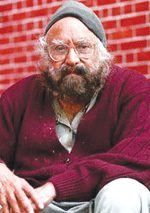 The Khushwant Singh Literary Festival, 2012 was staged in the military hill station of Kasauli (pop. 5,200) to celebrate the life and literary work of Khushwant Singh (98) who did much of his writing in Kasauli. A pioneer magazine journalist and editor (Illustrated Weekly of India, Hindustan Times), and syndicated columnist (‘With Malice Towards One and All’) during his long career spanning over seven decades, Singh who broke into national prominence with his novel Train to Pakistan (1956), has written over 42 books and hundreds of columns for numerous newspapers and magazines, served in the diplomatic corps, and a term in Parliament. The Khushwant Singh Literary Festival, 2012 was staged in the military hill station of Kasauli (pop. 5,200) to celebrate the life and literary work of Khushwant Singh (98) who did much of his writing in Kasauli. A pioneer magazine journalist and editor (Illustrated Weekly of India, Hindustan Times), and syndicated columnist (‘With Malice Towards One and All’) during his long career spanning over seven decades, Singh who broke into national prominence with his novel Train to Pakistan (1956), has written over 42 books and hundreds of columns for numerous newspapers and magazines, served in the diplomatic corps, and a term in Parliament.
Widely celebrated as a bon viveur with literary flair, Khushwant is also a health, fitness and well-being guru. Although he couldn’t attend the KS Litfest, Kasauli 2012 for logistics reasons, he sent delegates a ‘happiness quotient’ prescription reproduced below:
1. Foremost good health. Any ailment, however trivial, will deduct something from your happiness
2. Maintain a healthy bank balance, large enough to provide comforts with something to spare for recreation — dining out, movies, travel and holidays
3. Own your own home. Rented places can never give you the comfort or security of a home that is yours for keeps
4. Find an understanding companion, be it your spouse or friend. A divorce is preferable to acrimonious cohabitation
5. Don’t envy those who have done better than you in life, risen higher or made more money, or earned more fame. Envy can be very corroding
6. Don’t tolerate people indulging in idle chatter and gossip. You will be exhausted and poisoned by the gossip-mongering
7. Cultivate a hobby or two that will fulfill you — gardening, reading, writing, painting, playing or listening to music. Going to clubs and parties to get free drinks is a criminal waste of time
8. Every morning and evening, devote 15 minutes to introspection. In the morning, ten minutes should be spent on keeping the mind absolutely still, and five minutes to listing the things you have to do during the day
9. Never lose your temper. It does you more harm than good.
|
Rahul Singh with Niloufer Bilimoria